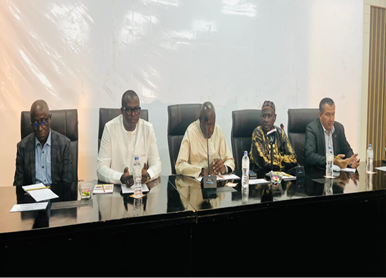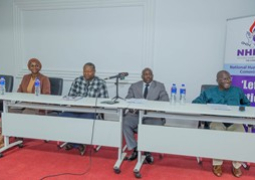
The event, currently underway at Bakadaji Hotel, is being organised by the Regional Rice Value Chain Development (RRVCD) project under the Central Projects Coordination Unit (CPCU) of the Ministry of Agriculture.
It is supported by the Islamic Development Bank in collaboration with AfricaRice. Twenty selected technical officers are participating in the intensive five-day training, which is expected to spark a nationwide impact through future regional trainings.
Moreover, the training curriculum covers crucial areas such as seed selection, certification, storage, varietal purity, and field inspection all led by some of the continent’s top rice experts.
At the start of the ceremony, Fafanding S. Fatajo, project director at the Ministry, emphasised the importance of the training in addressing the country’s ongoing food security challenges.
“Rice is not just a staple, it represents either hunger or satisfaction in our country. If there’s no rice, Gambians say they’re hungry, regardless of how much millet or maize is available. But we can’t talk about food security without discussing seed security. Quality seed is the foundation of everything.”
Fatajo acknowledged that the country currently imports approximately 75% of its rice, a situation that drains millions in foreign exchange and poses a serious threat to economic sustainability.
“The government’s vision, under the leadership of His Excellency the President, is to drastically reduce this dependency by building a resilient domestic rice production system one that prioritizes seed quality, farmer training, and evidence-based policy,” he said.
Speaking on behalf of the AfricaRice project, Dr. Ali Ibrahim, regional representative, described the workshop as a strategic intervention, not just a technical training.
He outlined the vital role of high-quality, climate-resilient, certified seed varieties in enhancing productivity, raising farmer incomes, and achieving national self-sufficiency in rice.
“This is part of a broader cooperation initiative across five countries. AfricaRice is here to support The Gambia not only through technical expertise but also by helping build a modern, efficient, and sustainable seed system.”
In his keynote address, Alhagie Nyangado, Permanent Secretary at the Ministry of Agriculture, reaffirmed government’s strong commitment to achieving rice self-sufficiency.
He cited three main pillars guiding this vision which includes- robust policy frameworks, targeted agricultural research, and dedicated political leadership.
“In agriculture, seeds are everything. If the seed system fails, the entire production chain collapses,” he said.
The training, he said, is about equipping our frontline actors, technicians, inspectors, and extension officers to lead this transformation from the grassroots.
In addition, Nyangado urged participants to take the training beyond the confines of the classroom and actively apply their knowledge in the field.
PS Nyangado equally encouraged them to build on recent studies and work closely with local farmers to enhance sustainable rice production across the country.




